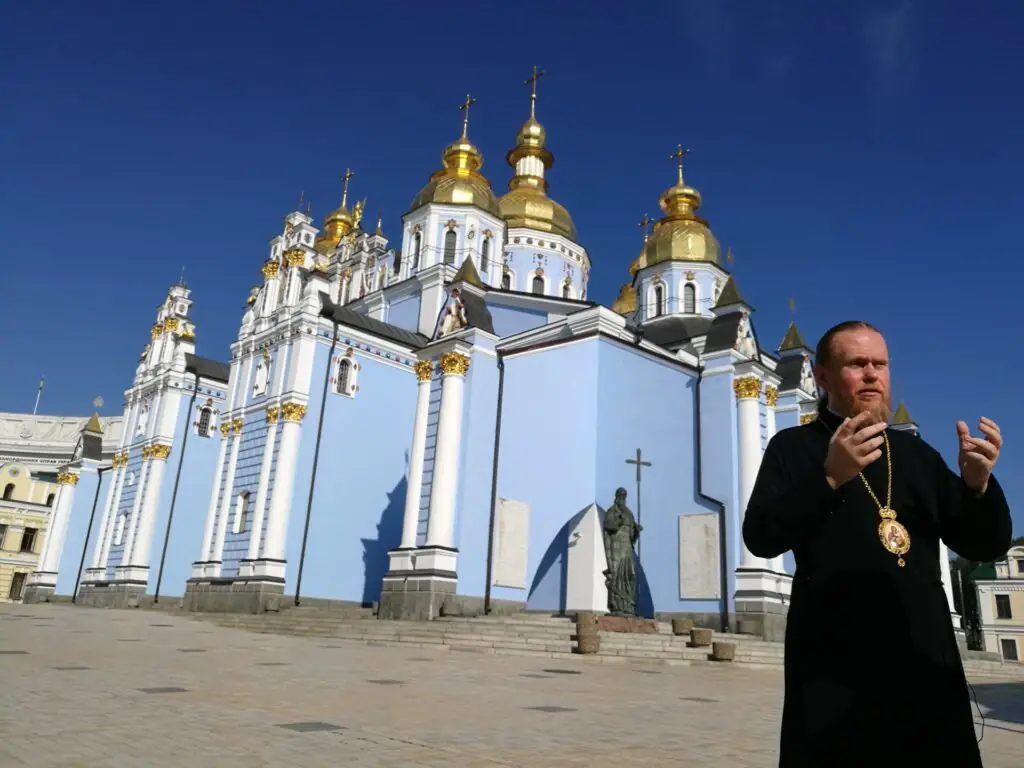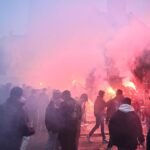Khust, Ukraine – “Praise Jesus” instead of “Hello” is often heard in Zakarpattia, the westernmost region of Ukraine.
Zakarpattia is known for piety, fascinating folklore, forested mountains and inventive smugglers. It used to be dominated by the Greek Catholic Church, which preserved Orthodox rites but viewed the Pope as its spiritual leader.
Zakarpattia was never part of Russia until Soviet leader Josef Stalin annexed it in 1944 and introduced the Russian Orthodox Church, whose top clerics worked with the KGB, the main security service of the Soviet era.
“Soviet intelligence either forced all the (Greek Catholic) priests into pro-communist orthodoxy or killed them in Siberia,” Oleh Dyba, a publicist and scholar of religious life in Transcarpathia, told Al Jazeera.
This is the second year Ukraine celebrates Christmas on December 25th, after centuries of celebrating it on January 7th according to the Gregorian calendar, which is still used by the Russian Orthodox Church.
Nevertheless, the formerly pro-Russian Ukrainian Orthodox Church (UOC) remains the country’s largest religious seat.
Moscow Patriarch Kirillwho heads the largest Orthodox see in the world, was one of those who collaborated with the KGB. He remains the closest ideological ally of Russian President Vladimir Putin, a former KGB colonel.
Kirill is accused of purging dissident priests, he called Moscow’s invasion of Ukraine a “holy war,” and he did said that the sins of Russian soldiers dying in Ukraine will be “washed away.”
“Russia is effectively returning to the discourse of medieval crusades,” Andrey Kordochkin, an Oxford-educated theologian who left Kirill’s church to join the Istanbul-based Patriarchate of Constantinople, told Al Jazeera.
More than a millennium ago, Constantinople sent Orthodox priests to baptize the Kiev prince Vladimir, a pagan Viking whose state gave rise to modern-day Ukraine, Russia and Belarus.
The UOC was a significant and essential part of Moscow’s religious empire, with thousands of parishes and priests.
Some of them held pro-Russian views after Moscow annexed Crimea in 2014 and supported separatists in the southeastern Donbass region.
“Their priest refused to pray for my cousin who fought in Donbass in 2015,” Filip, a resident of the Transcarpathian village of Chynadievo, told Al Jazeera. “I have never set foot in this church since.”
Meanwhile, the separatists turned against pro-Ukrainian clerics.
One of the targets was Archbishop Afanasy, who was threatened with a mock execution in the rebel “capital” of Luhansk in June 2014.
He was blindfolded, leaned against a wall and heard a shot that did not touch him.
He left Luhansk in his dilapidated car, whose brakes were deliberately damaged by the rebels, Afanasy told this reporter in 2018.
UOC vs OCU
In 2019, Ukraine’s pro-Western government established the new Orthodox Church of Ukraine (OCU), subordinate to the Patriarchate of Constantinople.
But despite appeasements, coercion and persecution of clergy, the formerly pro-Russian UOC remains Ukraine’s largest religious seat.
It officially broke away from Moscow and supported the war effort by welcoming refugees and raising humanitarian aid and donations for drones and medical supplies.
But many of its leaders are under fire for their real or perceived pro-Moscow sympathies.
Metropolitan Mark, a white-bearded 73-year-old whose religious empire revolves around the small Transcarpathian town of Khust, is one of them.
In the past two years, he has been accused of holding a Russian passport – along with two dozen high-ranking UOC clerics – and of building a $225,000 home in Sergiev Posad, a spiritual center outside Moscow, where he lived in the 1970s had studied for years.
Mark’s nephew, driver and deacon Volodymyr Petrovtsyi is charged with desertion after he fled his military unit in October, allegedly saying he did not want to fight his “Russian compatriots.”
One of Metropolitan Mark’s clergy told Al Jazeera that the claims about the house and the passport were false.
“I can tell you with all my heart that this is not true,” Father Vasily said as he stood in the Khust Cathedral, whose walls and ceiling were filled with depictions of evangelical scenes and icons.
However, he claimed that popular comedian Volodymyr Zelensky had already sought the support of the UOC in 2018 before the presidential election.
Father Vasily said, without providing evidence of that exchange, that Zelensky secured the support after promising to convert to Christianity – but never followed through on his alleged “promise.”
“He has been punishing and persecuting us ever since,” Father Wassily claimed.
Al Jazeera was unable to independently verify Vassily’s claims.
Since 2022, more than 100 UOC priests have been suspected of treason, collaborating with Moscow-appointed officials in occupied territories and spreading Russian propaganda, Ukraine’s Security Service, the main intelligence agency, said in August.
At that time, the Verkhovna Rada, the lower house of the Ukrainian parliament, banned the UOC to “strengthen national security and protect the constitutional order.”
“It’s quite risky to experiment with compatriots”
But the move is extremely counterproductive, according to a German researcher who has spent decades researching religious life in Ukraine and visiting dozens of parishes.
Far-right groups are violently pushing the UOC into submission, taking over communities and snubbing their community members fighting on the front lines, said Nikolay Mitrokhin of the University of Bremen.
“If Ukraine is losing on the battlefield, experimenting with its compatriots in this way is quite risky,” he told Al Jazeera.
The pressure violates Ukraine’s constitution and draws criticism from the entire West, jeopardizing the supply of military and financial aid, he said, adding that the pressure gives the Kremlin a perfect excuse to “explode Kiev’s neo-Nazi junta.” “To denounce and spread anti-Ukrainian messages and corresponding parishes in the Russian-occupied Ukrainian territories.
On December 16, popular chef Evhen Klopotenko filmed a culinary show about traditional Christmas dishes in the canteen of the Kiev Pechersk Lavra, a huge religious complex in central Kiev.
Most of the ancient complex belongs to the UOC.
The Kremlin responded to the news with predictable derision — and shared it with pro-Russian audiences in the former Soviet Union.
“They are taking over churches to turn them into circuses,” Nilufar Abdullaeva, a self-described “Russian patriot” who lives in Tashkent, the capital of Uzbekistan, told Al Jazeera. “They have lost all shame.”
The official ban on the UOC will only force it underground and “sooner or later emerge from it with the image of a martyr and a victor,” Mitrokhin said.
Finally, closing parishes can damage and destroy thousands of historic buildings that need constant care, repairs and heating in the harsh Ukrainian winters.
“The catastrophic destruction of frescoes and then buildings will begin shortly,” Mitrokhin said. “As a result, a large part of Ukraine’s cultural heritage will be lost.”





